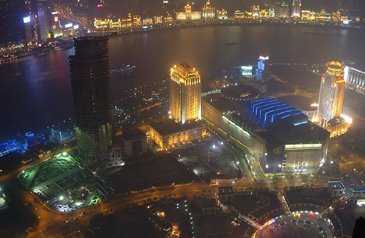
Chinese Economy Grows to 4th Largest in World
By Keith Bradsher
Huangpu River in Shanghai's Pudong area
HONG KONG, Jan. 25, 2006 — The Chinese economy grew 9.9 percent last year, the third year in a row of roughly 10 percent growth, government statisticians announced in Beijing on Wednesday.
The Chinese statistics, showing a national economic output of $2.26 trillion, sent China soaring past France, Britain and Italy to become the world's fourth-largest economy, after the United States, Japan and Germany.
Some economists adjust China's figures for the low value of its currency and low domestic prices to suggest that if valued at Western prices, China's output has surpassed Germany's as well.
From the clumps of tall cranes that dot the skylines of Chinese cities to the shopping malls packed with buyers to the containers full of exported shirts, toys and other goods that clog Chinese docks, the economy is growing so fast that some experts suggested on Wednesday that China may even have underestimated the true level of growth.
A figure of 10 percent or higher might send prices even higher for oil and other commodities that China imports, and might prompt the United States to make even stronger demands that China's currency be allowed to rise appreciably in value against the dollar, said Stephen Green, a China economist with Standard Chartered.
China, like most countries, calculates economic output mainly from data supplied by factories and other producers. But the government's own data on spending by the government, investors, consumers and foreign buyers suggests that the true rate of growth last year may have been as high as 15 percent, Mr. Green said.
Rising exports in particular have helped lift China to an average annual growth rate of 9.6 percent over the past quarter of a century. But economists said that Wednesday's figures showed that consumer spending was becoming increasingly important as well.
Liang Hong, an economist in the Goldman Sachs office here, noted that retail sales in China climbed 12.5 percent last year. "We believe domestic demand will increasingly become a much more important driver for growth and China will become a more positive force for global demand in the coming years," she said in a research report.
But some experts continue to question whether China is too reliant on investment spending and whether too much of that investment involves ill-considered splurges on new factories and the latest equipment even in industries like auto manufacturing and steel making, where overcapacity is becoming a serious problem.
China has been gradually whittling away the serious problem of non-performing loans at state-owned banks. But China remains heavily dependent on continued heavy borrowing by companies to build ever more factories and apartment buildings even as they struggle to earn enough profit on their existing facilities to repay previous loans.
"Given the evidence of deteriorating investment efficiency, China needs to rebalance its growth by shifting away from investment towards consumption," said Qu Hongbin, the senior economist for China at HSBC.
Strong Chinese demand for new power plants, cranes, high-speed locomotives and trucks has fueled a boom in Chinese imports of these and other kinds of capital equipment from Germany and Japan in particular. Tao Dong, the chief Asia economist for Credit Suisse, said that a detailed analysis showed that exports to China were playing a critical role in recent signs of a revival in the German and Japanese economies.
"China has become one of the forces lifting these two countries out of recession," he said.
The economic figures released on Wednesday are so strong that they suggest the Chinese economy may even be reaccelerating this winter despite the government's efforts to discourage property speculation through tax changes and administrative measures, Mr. Tao said.
One reason for the economy's strength is that the People's Bank of China, the central bank, has only raised its benchmark interest rate by slightly over a quarter of a percentage point in the last three years, even as the Federal Reserve has pushed through 13 quarter-point increases.
Despite China's relatively lax monetary policy, there has been little sign of inflation in recent months, as competition from new factories has held down prices for manufactured goods while steep rises in real estate prices have moderated.
Many consumer-oriented service businesses are now running at capacity as a result. Mr. Tao said that when he visited Beijing last week, he had to call seven high-end restaurants before he could find one that had a table free for dinner.
"After six restaurants turned me down, I said 'gee, the economy is booming.' " he recalled.
The above article is from The New York Times.
